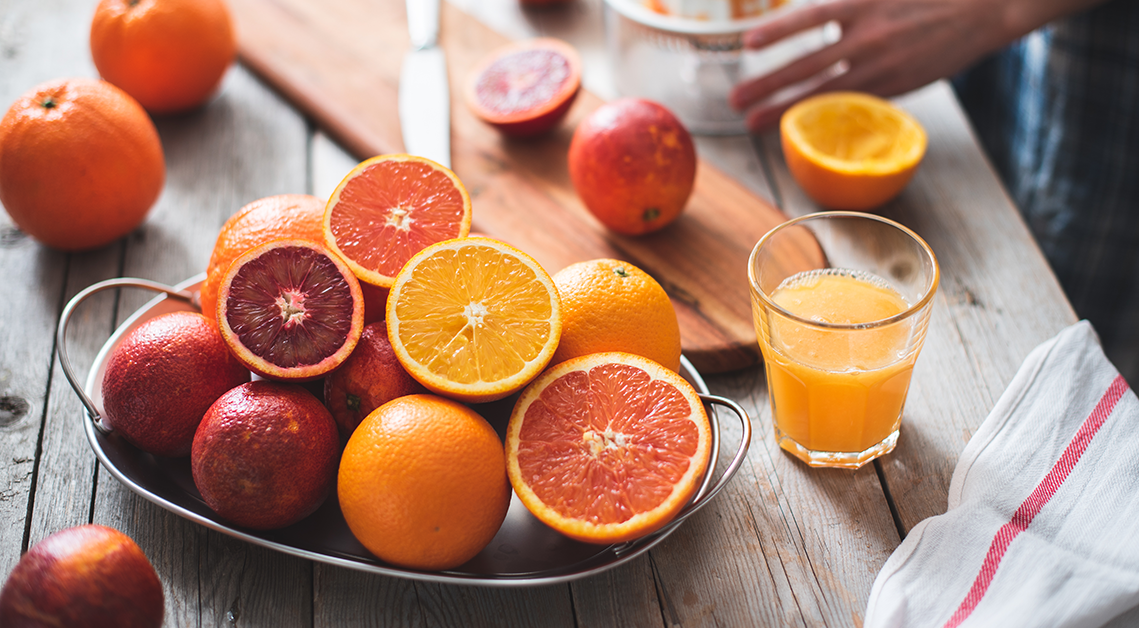
Written by Accredited Dietitian Themis Chryssidis
You may feel like catching a cold is an inevitable part of winter, but what are some of the foods we can eat to boost our immunity and keep the germs at bay?

Themis Chryssidis, dietitian and Managing Director of Sprout Cooking School and Health Studio says there are a few foods we can eat during the colder months to help keep our bodies healthy and in balance.
“There are lots of clues around us to let us know what we should be eating and when,” Themis says. “Take citrus for example. It is high in Vitamin C, which is one of the vitamins we know helps to boost our immune system and helps us to fight off germs. And, it just happens to be at its peak in winter. When foods are in season they are more nutrient-dense than outside of their peak. They also taste better, with a sweeter, fuller flavour.”
Here are some of the top immune-boosting nutrients that Themis recommends to eat over winter and why:
Vitamin C
Helping to form fibrous tissues in the body such as skin, bones and blood vessels, vitamin C is involved in many parts of the immune system. For example, it stimulates the production and function of your white blood cells. These cells help your body produce antibodies to neutralise germs. It’s a water-soluble vitamin, meaning our bodies can’t store it, so we need to ingest a constant supply.
What foods to eat: citrus, broccoli, capsicum and leafy greens are all good sources of Vitamin C.
Vitamin A
Vitamin A supports a healthy immune system by promoting cell growth and development, as well as the production of mucus membranes (which act as a physical barrier to stop germs getting into the body). Vitamin A also prevents dry skin, ensuring germs don’t get through cracks in the skin. A fat soluble vitamin, Vitamin A is absorbed along with the fats we eat and can be stored in our body.
What foods to eat: Look out for those orange foods such as carrots, pumpkin and sweet potato.
Vitamin E
A powerful antioxidant, vitamin E reduces the effect of free radicals (which are linked to a host of diseases and aging) in our body. Vitamin E and other antioxidants help our body to rebuild cells, so we’re able to fight off germs.
What foods to eat: Nuts, seeds, avocados, olive oil, salmon and kiwi fruit.
Healthy Fats
It may sound strange, but fats are an important part of our diet. Healthy fats help us to store and absorb fat soluble vitamins, like Vitamins A and E. Both poly and monounsaturated fats can be part of a healthy diet which will keep your immune system in balance.
What foods to eat: Avocados, unsalted nuts such as almonds, cashews and peanuts, olive oil.
Probiotic foods
Probiotic foods promote a healthy gut, which is where the majority of our immune system resides. Healthy gut bacteria, or microbiome, thrives on fermented food and resistant starch.
What foods to eat: Fermented vegetables such as sauerkraut and kimchi, yoghurt, kefir, kombucha and miso. Resistant starch is readily available in starchy foods such as potatoes and rice which have been cooked, and then cooled before being eaten.
Bonus booster: Water
Staying hydrated helps your body naturally eliminate toxins and the build-up of bacteria that may cause illness. Aim for two litres of water a day, or more if you’re exercising.
In addition to a healthy diet, practising good food and hand hygiene are excellent ways to reduce your likelihood of falling sick this winter. If you do develop an illness, please contact your GP.
Posted: May 12 2021
Disclaimer
© Copyright Health Partners. 2025 All Rights Reserved.
Health Partners is committed to providing quality and affordable health care, and we value our members and our obligation to protect your privacy. As part of our responsibility in protecting your privacy, from time to time we review our policies to ensure we are meeting our obligations. We have recently made some updates to our Privacy Policy. Please click here to view the Health Partners Privacy Policy.
© Copyright Health Partners. 2025 All Rights Reserved.
Health Partners is committed to providing quality and affordable health care, and we value our members and our obligation to protect your privacy. As part of our responsibility in protecting your privacy, from time to time we review our policies to ensure we are meeting our obligations. We have recently made some updates to our Privacy Policy. Please click here to view the Health Partners Privacy Policy.



